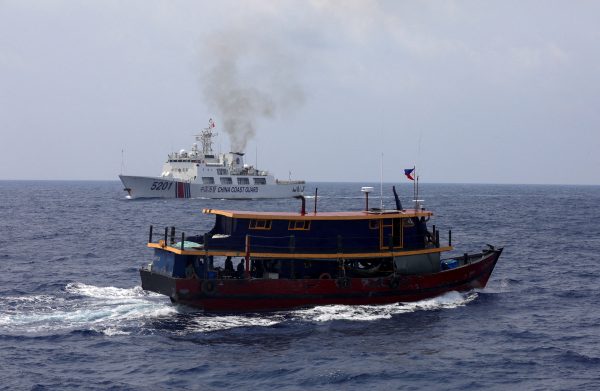Taiwan and the crisis of international stability that would be brought on by a hypothetical Chinese invasion have captured significant attention. While this attention is rightly deserved, territorial and economic disputes in the South China Sea are no less noteworthy given their potential impact on regional and global stability.
This importance was reinforced in August 2023 when a Chinese Coast Guard vessel intercepted a Philippines resupply mission to one of the disputed South China Sea islands. Attempts to reduce tensions in the South China Sea should be a priority for the various claimants, which include China, Vietnam and the Philippines.
A survey of South China Sea professionals and academics offers a potential avenue to do just that. The survey suggests that tackling shared environmental threats through increased bilateral scientific cooperation might be a promising path forward.
While most of the regional experts interviewed consider the territorial disputes between China and its Southeast Asian neighbours to be the primary issue of concern, the overwhelming majority of survey participants also agree that there are significant economic and environmental concerns exacerbating these disputes.
The South China Sea is a major fishing ground for many states, accounting for nearly 12 per cent of fish caught globally. International recognition of territorial control of certain geographic features permits a state to claim the accompanying economic exclusion zone and harvest vast quantities of food. The region is also home to an estimated 11 billion barrels of untapped oil and 190 trillion cubic feet of natural gas. The South China Sea is a critical trade lane as well, with one third of global shipping passing through the region.
China is the greatest violator of economic exclusion zones and the largest contributor to militarisation and illegal resource extraction within the region. Beyond claiming economic ownership of the region’s resources, China asserts that the islands of the South China Sea are Chinese territory and has built up islands and reefs to sustain large-scale military assets such as aircraft, missiles and naval vessels.
But China is not the only participant militarising the region. Vietnam’s reported plans to fortify its existing military installations in the South China Sea make scientific diplomacy more vital than ever.
Bilateral scientific diplomacy — the direct support of foreign policy processes through scientific advice and evidence — offers the best course of action for ensuring regional stability. Issues such as overfishing, coral bleaching and pollution all stand to cripple the region’s environmental health and economic vitality. Geopolitical competition has ensured that these regional threats have only been addressed on a piecemeal and state-by-state basis. Building trust and science-based relations has the potential to reduce these tensions over time and build a framework for broader cooperation.
The idea of bilateral scientific cooperation between South China Sea claimants is not new. The Philippines and Vietnam have a scientific research agreement in place that dates back to 1994. Even direct rivals China and Vietnam abide by the 2004 Gulf of Tonkin Agreement, which established cooperation in fishing, hydrocarbon extraction and maritime security.
While scientific multilateral agreements do exist, this method is unlikely to establish a comprehensive and obligatory multilateral framework for conflict resolution in the South China Sea. All parties to South China Sea disputes are signatories of the UN Convention on the Law of the Sea — a supposedly binding agreement on naval rights and environmental responsibilities — but the parties have not succeeded in adhering to a regional framework to accomplish these goals because of their territorial disputes.
A significant majority of the survey participants reject regional frameworks like the Antarctic Treaty as a model for scientific collaboration and diplomatic engagement in the South China Sea. Although Antarctica is also no stranger to territorial disputes, the South China Sea’s proximity to regional powers and the greater extractive potential of its natural resources makes the successful reduction of tensions through multilateral agreement — scientific or not — less likely.
Bilateral diplomacy does have risks of its own by increasing the individual leverage of any state upon mutual policy. China has advocated for bilateral negotiations with ASEAN states to ’divide and rule’ the organisation and prevent a unified regional response to its territorial claims. Although this a legitimate concern, multilateral agreements are unlikely to form or to ensure de-escalation. Regional states must carefully pursue bilateral science diplomacy to de-escalate tensions while not permitting these relationships to become one-sided and detrimental to their sovereignty.
While a web of bilateral scientific relationships will not resolve existing territorial disputes in the South China Sea nor provide the potential for scientific advancement that a regional forum would, all potential methods of opening communication and reducing tensions in the region are worth exploring. And with enough scientific cooperation, the region’s environmental health just might improve too.
David Hessen is Managing Editor at South China Sea NewsWire.

